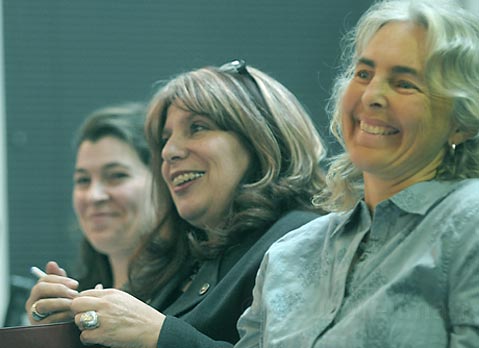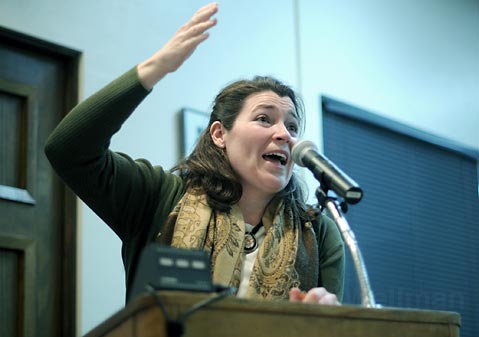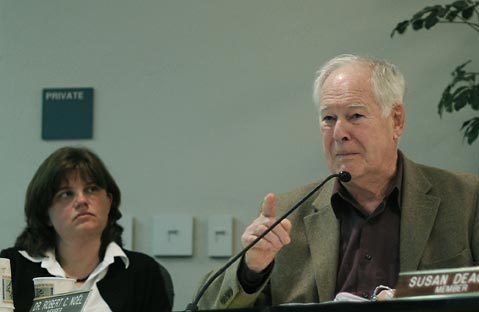Charting a Course
César Chávez School Starts Down the Road of Reinvention

Sometimes in life you have to go away in order to comeback, or at least that is what the folks from César Chávez elementary school are banking on. Just before Thanksgiving, the chronically underperforming and hugely popular K-6 dual-language immersion elementary school was fighting for a charter renewal from the Santa Barbara School District despite, at least in the opinion of Superintendent Brian Sarvis, not legally qualifying to do so. The school board eventually voted to stave off a potential mid-year shutdown from the state and let the school decide whether it would seek renewal despite Sarvis’s assessments or whether it would scrap the old school altogether and float a new charter proposal, reinventing itself as a new and improved — albeit very familiar — school. At this week’s school board meeting, armed with a new principal and a draft of an entirely new charter proposal, César Chávez officially answered that question.
In the four months since that fateful hearing, according to César Chávez’s Governance Committee President Lee Fleming, the entire school community — from parents to teachers to interim principals to district administrators — has been working overtime to figure out a way to save Santa Barbara’s most bold (and many would say, important) educational experiment. First came a shakeup in leadership, with the replacement — at the district’s behest — of principal Eva Neuer by interim principal and former Peabody Charter School principal Pat Morales. And, just last week, Morales handed the reins over to permanent principal Juanita Hernandez, who has more than 20 years of experience as a bilingual educator and administrator. Next, the school was forced to ponder why, after 10 years, it continued to produce substandard test results and, most importantly, what could be done to ensure that the future school would not suffer similar pitfalls. “There was a lot of mystery [as to why standardized test results were so low], but we have debunked most of that now,” said Fleming Tuesday night. “It has been a journey we have gone on as a community in a short but extremely intense period of time.”

To that end — in addition to regular Governance Council meetings on the subject and on-the-ground assessments of teachers and the school’s facilities by Morales — Fleming and company did extensive outreach to several “successful” dual-immersion language schools around California and across the country to determine what works best when trying to balance academic excellence with a firm commitment to having a campus where two languages are valued equally.
The findings of this exploration helped inform the draft presented to the board on Tuesday night. While seeking a new charter means that the current César Chávez school will close for good at school-year end in June, it also means that — if all goes well — a new and improved César Chávez will reopen next fall with the same students, faculty, and staff. As outlined in the proposal, the new school will have clearly stated teaching standards for all classes and grades — standards derived mainly from the successful schools consulted. “In the past, we had a lot of great teachers doing great things, but there was not much consistency in the approach. … Now, kids will get the same kind of approach in every classroom,” summed up Fleming. Secondly, there will be increased accountability not only for the students’ performance with regular progress assessments, but also for the school’s principal and teachers. Thirdly, the school budget will provide for professional development days for teachers and a one-week intensive teacher planning session before next year. Lastly, and most significantly, the new César Chávez will commingle its primary English and primary Spanish language speakers all day every day; in the past, they only spent about half the day together and never in language classes until the third grade. “There is no doubt that it is possible to achieve, but we have to implement these changes with complete fidelity to the two-way model,” stated Fleming.

For their part, most of the board expressed varying degrees of support, while offering up such dealmakers as a working budget forecast, specific school bylaws, plans for recruiting, and an explanation of how exactly the future Governance Committee will operate. However, board member Bob Noël asked for even more stringent student assessment review and better stated benchmarks for performance. Without them, Noël opined, “I don’t see any real qualitative differences between this and the old school. And the old school, in my opinion, was a failure.”
Also muddling César Chávez’s bid for reinvention is news earlier this week that it is on a list of the 188 lowest-performing public schools in California and, as per recent state legislation, will have to either completely overhaul its operations or simply shut down. Even worse, according to Sarvis, charter schools on the list have only the shutdown option. What exactly all this means in terms of César Chávez’s bid to close, seek a new charter, and then reopen next fall without missing a beat remains to be seen.
In the meantime, César Chávez supporters are hopeful that they can get a final version of the charter proposal back to the board for potential approval within the coming weeks.



